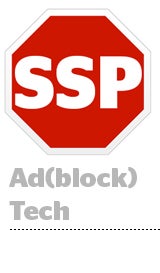 Germany-based Adblock Plus (ABP) on Tuesday debuted its beta supply-side platform (SSP) offering, called the Acceptable Ads Platform. It marks the company’s first move into an ad tech space it typically criticizes.
Germany-based Adblock Plus (ABP) on Tuesday debuted its beta supply-side platform (SSP) offering, called the Acceptable Ads Platform. It marks the company’s first move into an ad tech space it typically criticizes.
“We’ve always called the Acceptable Ads initiative an ongoing experiment,” ABP ops manager Ben Williams told AdExchanger. “We’ve improved it over time, surveying users and the like, and we updated the criteria one time, but now we feel like it’s time to make more substantive improvements.”
ABP is partnering with the Israeli startup ComboTag, a supply-side network, to build an ad tech conduit directly to its mobile and desktop ad-block software users.
The Acceptable Ads program lets publishers sign up for an approval process so ads can be shown to readers who have an ad blocker, and the most trafficked publishers pay for whitelisting. The process means every individual ad must be verified, resulting in a slower (read: worse) user experience.
But ABP’s SSP service pre-approves websites, and the demand comes similarly pre-approved through ComboTag’s product, which vets buyers coming from Google AdX and AppNexus.
ComboTag pitched the idea to ABP eight months ago when co-founder and CEO Guy Tytunovich (an ABP user) saw the Acceptable Ads initiative as a strong application for his startup’s own supply-side tech road map. “We’re an ad tech company and our aim was already to make those publishers change their ways and be less intrusive,” said Tytunovich.
The product is also an acknowledgement from ABP that its own publisher outreach had a low ceiling. “Some publishers just had a problem paying an ad blocker,” said Williams.
With ComboTag signing up publishers and Google AdX/AppNexus pulling the cart on the demand side, ABP has a layer of separation – though that might not stop advertising stakeholders from continuing to cry extortion.
Tytunovich said he expects a degree of antagonism from “a very, very cynical ad tech community” over an ad blocker shifting to an SSP model, but he isn’t worried “because our intentions are good.”
In some ways the new model makes ABP more like Facebook – an app with an audience it sees as its own, justifying tight restrictions on how marketers reach those users.
The world’s leading ad blocker and the world’s leading social platform have butted heads recently over which has the fundamental right to dictate ads displayed to shared users.
“This is where advertising is going for these kinds of users, more privacy-conscious people who have ad blockers,” said Williams. “This is a specialized audience with specific needs.”











